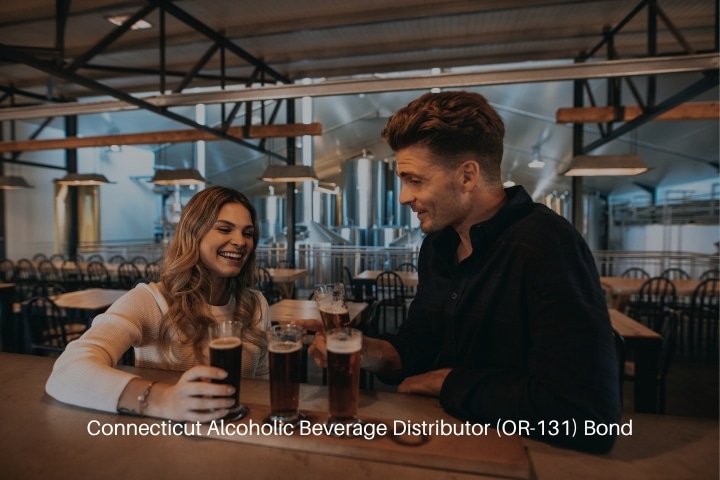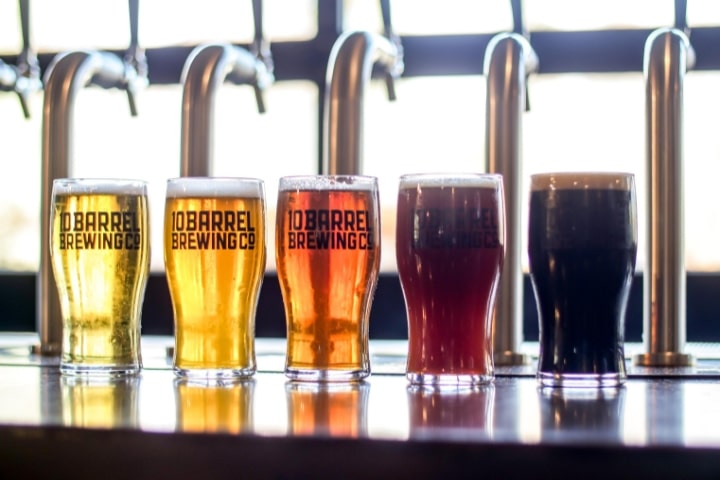
Get An Instant Quote on Connecticut Alcoholic Beverage Distributor (OR-131) Bond Now
In the intricate world of alcohol distribution, regulatory compliance and financial responsibility are paramount. Connecticut, like many states, mandates that alcoholic beverage distributors obtain a bond to ensure adherence to laws governing the sale and distribution of alcoholic beverages. The Connecticut Alcoholic Beverage Distributor (OR-131) Bond serves as a crucial component in this regulatory framework, providing financial security and guaranteeing compliance with state regulations. In this article, we delve into the details of this bond, exploring its purpose, requirements, and significance in the alcoholic beverage industry.
The primary purpose of the Connecticut Alcoholic Beverage Distributor (OR-131) Bond is to protect the interests of the state and consumers by holding distributors accountable for their actions. By requiring distributors to obtain this bond, Connecticut aims to ensure compliance with regulations aimed at preventing the illegal sale, distribution, or consumption of alcoholic beverages. Additionally, the bond provides a form of recourse for the state or affected parties in the event of non-compliance or violations of alcoholic beverage laws.
Any entity seeking to engage in the distribution of alcoholic beverages within Connecticut is required to obtain the Alcoholic Beverage Distributor (OR-131) Bond as part of the licensing process. This requirement applies to both new applicants seeking licensure and existing distributors renewing their licenses. Failure to obtain or maintain the bond may result in the denial or revocation of the distributor’s license, prohibiting them from legally distributing alcoholic beverages within the state.
To obtain the Connecticut Alcoholic Beverage Distributor (OR-131) Bond, distributors typically work with a licensed surety bond provider authorized to operate within the state. The bond amount is determined based on factors such as the distributor’s projected sales volume and compliance history. In the event of distributor default or violation of state regulations, affected parties, such as the state or consumers, may file claims against the bond to seek financial compensation for any damages or losses incurred.
The Connecticut Alcoholic Beverage Distributor (OR-131) Bond plays a crucial role in maintaining regulatory compliance and consumer protection in the alcoholic beverage industry within the state. By requiring distributors to obtain this bond, Connecticut demonstrates its commitment to preventing illegal alcohol sales and ensuring the safety and well-being of its residents. As distributors continue to navigate the complexities of the alcoholic beverage market, the Alcoholic Beverage Distributor (OR-131) Bond remains an essential tool in promoting accountability and integrity in alcohol distribution practices.
The Connecticut Alcoholic Beverage Distributor (OR-131) Bond is a type of surety bond required by the Connecticut Department of Consumer Protection for entities engaged in the distribution of alcoholic beverages within the state. This bond serves as a financial guarantee, ensuring that distributors adhere to state laws and regulations governing the sale and distribution of alcoholic beverages.

In certain scenarios where non-alcoholic beverage distributors sell their products alongside alcoholic beverages, they may be required to obtain the Connecticut Alcoholic Beverage Distributor (OR-131) Bond. The determination typically depends on the specific regulations and licensing requirements set forth by the Connecticut Department of Consumer Protection. If the sale of non-alcoholic beverages is directly associated with or supports the sale of alcoholic beverages, regulators may require these distributors to obtain the bond to ensure compliance with laws governing alcoholic beverage distribution. It’s advisable for distributors to consult with legal counsel or regulatory authorities for clarification on their specific obligations.
While the Connecticut Alcoholic Beverage Distributor (OR-131) Bond is a standard requirement for most distributors of alcoholic beverages within the state, there may be exemptions or alternative arrangements available for small-scale distributors or those operating within niche markets. State regulators may offer exemptions or reduced bonding requirements for distributors with limited sales volumes or those operating in specialized segments of the alcoholic beverage market. Additionally, distributors may explore alternative forms of financial assurance, such as dedicated trust funds or letters of credit, as permissible substitutes for the bond. However, eligibility for exemptions or alternative arrangements is subject to approval by regulatory authorities, and distributors should seek guidance to ensure compliance with applicable laws and regulations.
If consumers encounter issues with a distributor who has failed to fulfill their obligations under the Connecticut Alcoholic Beverage Distributor (OR-131) Bond, they may have recourse through various channels. Consumers can file complaints with the Connecticut Department of Consumer Protection, which oversees alcoholic beverage licensing and enforcement of bonding requirements. Additionally, consumers may have the option to pursue legal action against the distributor to seek compensation for any damages or losses incurred due to non-compliance with state regulations. It’s essential for consumers to document any issues or concerns and report them promptly to the appropriate authorities for investigation and resolution.
Axcess Surety is the premier provider of surety bonds nationally. We work individuals and businesses across the country to provide the best surety bond programs at the best price.